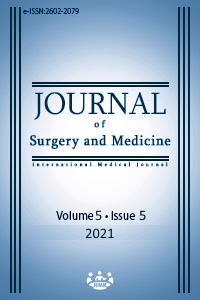Incidental thorax imaging findings in abdominal computed tomography: Results of a tertiary center
Keywords:
Abdominal computed tomography, Chest computed tomography, COVID-19, Incidental findings, Pulmonary noduleAbstract
Background/Aim: Abdominal computed tomography (ACT) is a frequently used imaging modality. The large imaging area often results in the inclusion of lower sections of the thorax. It is known that some thoracic pathologies have symptoms that mimic upper abdominal pathologies. It is possible to detect many pathologies with careful examination of these levels. Previous studies have been conducted to detect incidental chest findings in imaging methods performed for emergency reasons such as trauma, but there is no study in the literature investigating incidental chest findings in ACT imaging. The aim of this study is to determine the incidental findings detected in thoracic sections included in abdominal computed tomography (CT) images and the prevalence of these findings in a tertiary center. Methods: This descriptive study includes 1133 patients who were admitted to Adıyaman Training and Research Hospital between 2017-2020 due to abdominal pain, diarrhea, vomiting, weight loss, constipation, and recurrent urinary tract infection, and underwent abdominal CT scanning. The necessary local ethics committee approval was obtained. Incidental findings in thoracic areas shown in the abdominal CT images included mediastinal findings, infectious findings, pulmonary lesions, pleural findings, lung parenchyma and pleural findings. Results: The mean age of the patients was 43.8 (18.7) years. Incidental findings were detected in 49.2% of the patients, the most common being those related to the lung parenchyma and the pleura (20.7%). The most common lung lesions were pulmonary nodules smaller than 1 cm (5%). In addition, 116 (10.2%) patients had infectious findings, among which the images of 31 (2.7%) suggested bacterial pneumonia factors, and 17 (1.5%) had interstitial pneumonia findings due to the SARS-CoV2 virus. Conclusion: According to the results of this study, evaluation of pathologies detected incidentally in the thorax in ACT sections may affect the treatment of patients. In addition, evaluation, follow-up, and early treatment of lung nodules that can be detected incidentally can prevent possible advanced stage malignancies. Although the symptoms and clinical statuses of the patients are very useful in evaluating the images, examination of every structure included in the imaging field may play a role in the early diagnosis and treatment of some pathologies.
Downloads
References
Marcus PM, Bergstralh EJ, Zweig MH, et al. Extended lung cancer incidence follow-up in the Mayo Lung Project and over diagnosis. J Natl Cancer Inst. 2006;98:748Y756.
Jacobs PC, Mali WP, Grobbee DE, van der Graaf Y. Prevalence of incidental findings in computed tomographic screening of the chest: a systematic review. J Comput Assist Tomogr. 2008;32(2):214-21.
van Vugt R, Kool DR, Deunk J, Edwards MJ. Effects on mortality, treatment, and time management as a result of routine use of total body computed tomography in blunt high-energy trauma patients. J Trauma Acute Care Surg. 2012;72:553–9.
Sierink JC, Saltzherr TP, Reitsma JB, Van Delden OM, Luitse JS, Goslings JC. Systematic review and meta-analysis of immediate total-body computed tomography compared with selective radiological imaging of injured patients. Br J Surg. 2012;99(Suppl. 1):52–8.
Healy DA, Hegarty A, Feeley I, Clarke-Moloney M, Grace PA, Walsh SR. Systematic review and meta-analysis of routine total body CT compared with selective CT in trauma patients. Emerg Med J. 2013.
Messersmith WA, Brown DF, Barry MJ. The prevalence and implications of incidental findings on ED abdominal CT scans. Am J Emerg Med. 2001;19:479–81.
Barrett TW, Schierling M, Zhou C et al. Prevalence of incidental findings in trauma patients detected by computed tomography imaging. Am J Emerg Med. 2009;27:428–35.
Hoffstetter P, Herold T, Daneschnejad M, et al. Non-trauma-associated additional findings in whole-body CT examinations in patients with multiple trauma. Rofo. 2008;180:120–6.
Kumada K, Murakami N, Okada H, Toyoda I, Ogura S, Asano T. Incidental findings on whole-body computed tomography in trauma patients: the current state of incidental findings and the effect of implementation of a feedback system. Acute Med Surg. 2019;6(3):274-278. Published 2019 Mar 27.
Gil BN, Ran K, Tamar G, et al. Prevalence of significant noncardiac findings on coronary multidetector computed tomography angiography in asymptomatic patients. J Comput Assist Tomogr. 2007;31:1Y4.
Henschke CI, Lee IJ, Wu N, et al. CT screening for lung cancer: prevalence and incidence of mediastinal masses. Radiology. 2006; 239:586Y590.
Alpert JB, Fantauzzi JP, Melamud K, Greenwood H, Naidich DP, Ko JP. Clinical significance of lung nodules reported on abdominal CT. AJR Am J Roentgenol. 2012;198(4):793-9.
Hammerschlag G, Cao J, Gumm K, Irving L, Steinfort D. Prevalence of incidental pulmonary nodules on computed tomography of the thorax in trauma patients. Intern Med J. 2015;45(6):630-3.
James MK, Francois MP, Yoeli G, Doughlin GK, Lee SW. Incidental findings in blunt trauma patients: prevalence, follow-up documentation, and risk factors. Emerg Radiol. 2017;24(4):347-53.
Devine AS, Jackson CS, Lyons L, Mason JD. Frequency of incidental findings on computed tomography of trauma patients. West J Emerg Med. 2010;11(1):24-7.
Barrett TW, Schierling M, Zhou C, et al. Prevalence of incidental findings in trauma patients detected by computed tomography imaging. Am J Emerg Med. 2009;27(4):428-35.
King MJ, Lewis S, El Homsi M, et al. Lung base CT findings in COVID-19 adult patients presenting with acute abdominal complaints: case series from a major New York City health system. Eur Radiol. 2020;30(12):6685-93.
Downloads
- 644 693
Published
Issue
Section
How to Cite
License
Copyright (c) 2021 Ela Kaplan, Ercan Çil
This work is licensed under a Creative Commons Attribution-NonCommercial-NoDerivatives 4.0 International License.
















